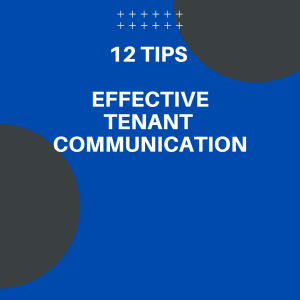
Tenant Communication is Key: Effective Tenant Communication
Effective tenant communication is crucial for landlords to ensure smooth operations, maintain good relationships, and address issues promptly. Here are some tips for landlords to manage effective tenant communication:
Establish Clear Communication Channels
Dedicated Contact Methods: Provide tenants with specific email addresses, phone numbers, or a messaging platform for communication.
Office Hours: Set and communicate specific hours when tenants can expect responses.
Be Accessible and Responsive
Timely Responses: Respond to tenant inquiries promptly, ideally within 24 hours.
Availability: Make sure tenants know how to reach you in case of emergencies.
Use Technology
Tenant Portals: Utilize online portals for maintenance requests, rent payments, and general inquiries.
Automated Updates: Use automated systems to send rent reminders, maintenance schedules, and other important notifications.
Set Clear Expectations
Lease Agreements: Clearly outline rules, responsibilities, and procedures in the lease agreement.
Welcome Packets: Provide new tenants with a packet containing essential information, contact details, and house rules.
Regular Communication
Newsletters: Send regular newsletters with updates, tips, and important information.
Periodic Check-Ins: Schedule periodic check-ins to discuss any concerns or issues tenants might have.
Document Everything
Written Communication: Follow up verbal agreements or conversations with written summaries to ensure clarity and keep a record.
Maintenance Logs: Keep detailed records of maintenance requests and resolutions.
Be Professional and Respectful
Professional Tone: Maintain a professional tone in all communications, even when dealing with difficult situations.
Respect Privacy: Respect tenants’ privacy and notify them in advance of any visits or inspections.
Address Issues Proactively
Prompt Resolution: Address maintenance requests and other issues promptly to avoid escalation.
Preventative Maintenance: Schedule regular maintenance checks to prevent problems before they arise.
Encourage Feedback
Surveys: Conduct periodic surveys to gather feedback on tenant satisfaction and areas for improvement.
Open Door Policy: Encourage tenants to voice their concerns and suggestions at any time.
Stay Informed and Updated
Legal Requirements: Stay informed about local laws and regulations related to tenant communication and property management.
Market Trends: Keep up with market trends and best practices in property management to continuously improve your communication strategies.
Conflict Resolution
Neutral Mediator: In case of conflicts, consider involving a neutral mediator to resolve issues amicably.
Clear Procedures: Establish and communicate clear procedures for handling disputes.
Personal Touch
Know Your Tenants: Take the time to know your tenants and build a rapport.
Personalized Messages: Occasionally send personalized messages or greetings to show you value them as individuals.
By implementing these tips, landlords can foster a positive and productive relationship with their tenants, leading to higher satisfaction, better retention rates, and smoother property management.